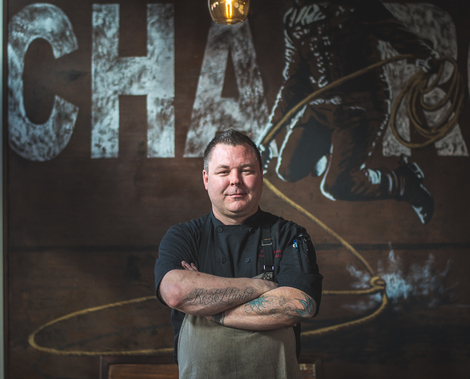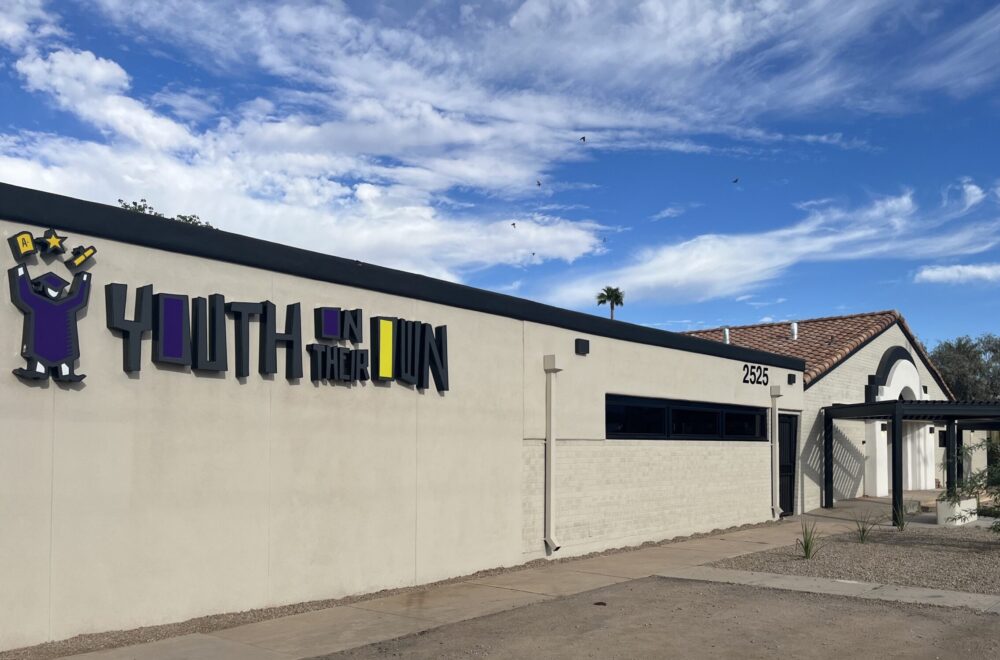
Gary Hickey is the chef-partner at Charro Steak, Charro del Rey, and Charrovida. He is a former YOTO alumnus, graduating in the early 1990s.
The food service industry has faced significant challenges since the COVID-19 outbreak. Restaurants have had to adapt to changing local and state public health policies in order to remain open and operational. Many members of the Youth On Their Own (YOTO) Family work in the Pima County food service industry and have felt the effects of the changes. We checked in with some of these individuals to learn more about their experiences during this difficult time.
Gary Hickey, executive chef for Flores Concepts and chef-partner at Charro Steak, Charro del Rey, and Charrovida, recently shared some of the obstacles his restaurants have faced. Gary noted that when the City of Tucson order prohibiting dine-in services took effect on March 17, all of their restaurants closed for a couple days in order to regroup and determine the best path forward. Charro del Rey, which offers Pacific Ocean-sourced fresh seafood, was more difficult to adapt to a take-out model so Gary and his team decided to close the business temporarily and focus their efforts on Charro Steak.
For Charro Steak, Gary created a meal kit system with five cuts of meat and everything one would need to do a family cookout all for fifty dollars. It was hugely successful right off the bat with the meal kits selling out within four hours on the first day. After being open for a few weeks, Charro Vida recently closed in order to remodel and rebrand their service model.
Sadly, 320 Flores Concepts employees from numerous restaurants around Tucson were laid off. Gary explained that he has tried to keep in touch with as many of the laid off employees as he can – averaging about 80-100 people a week – through social media and text message. He said he is most frustrated by the fact that many of these individuals have not received their unemployment benefits due to government processing backlogs. Gary explained, “These are people that I care about, that I’ve worked 60-70 hours a week with, and now they are struggling to get by because they haven’t gotten any kind of government assistance whatsoever.”
Gary has a special connection with Youth On Their Own being a former YOTO alumnus. He attended Amphitheater High School and graduated in the early 1990s, when YOTO was still a relatively new organization providing services to youth experiencing homelessness in the community. In 2019, Charro Vida hosted YOTO’s fall brunch, and prior to that, several of YOTO’s wine tasting and silent auction fundraising events were held at McMahon’s Steakhouse, another restaurant where Gary previously served as executive chef.
A YOTO high school senior also working in the food service industry as a cashier agreed to talk about her experiences over the past few months. In order to protect her identity, she has asked to remain anonymous and not reveal the name of the restaurant where she works.
She candidly spoke about her feelings of worry and uncertainty when the pandemic first began to dominate the news in February and early March. “Since I lived on my own, I actually felt scared because I thought to myself ‘if I did have the virus, who would be there by my side, who would be there for me?’ It made me emotional.”
Prior to the COVID-19 outbreak, she was working six-hour shifts, three days per week. After the March 17 order took effect and the restaurant where she worked moved solely to a take-out and delivery model, she has been working longer shifts more often, typically eight- to ten-hour shifts, five to seven days a week. This has been good news for her in one respect as she has been able to earn more money and still stay on top of her rent while school is closed. Unfortunately, this has also meant that she has less time to dedicate to keeping up with school through the online learning opportunities offered by her teachers.
She shared about many of the new public health and safety protocols the restaurant put in place in order to ensure employee and customer safety, including wearing gloves and each employee on the line being restricted to their own area behind the counter in order to ensure physical distancing. She mentioned that for a short while she was not allowed to touch or bag any food as she normally would if her co-workers needed help since she had to stay on cashier duty. Since then, some of the rules have been lifted. She is once again allowed to help her co-workers with bagging food if she washes her hands and changes her gloves before and after interacting with the food. She noted that she would be fine with the precautions continuing in the future because she knows that the overall goal is to ensure everyone’s safety.
Another observation she revealed was the change in temperament of delivery workers (e.g. Door Dash, Postmakes, Uber Eats). With her team operating with less employees because of the pandemic, this has sometimes resulted in longer wait times during peak hours.
“At one point I was trying to help my co-workers fill their online orders so that they could get back to helping customers who were actually coming in. Then a delivery guy asked ‘What the heck is taking so long? Let me just go back there and I’ll do it myself. I bet I could finish it faster than you.’ It was just so hurtful because we are doing everything that we can to make sure we deliver the best food to them.”
She has also noticed walk-in customers being less-than-understanding in the past few months. She explained that as a response to fewer orders than usual coming in and in an effort to ensure food is as fresh as possible and to reduce food waste, the restaurant started cooking smaller quantities of certain items. Some customers have angrily expressed their frustration when the restaurant would be out of those items. In some cases, customers would arrive minutes before closing and complain when items were not available.
This tactful young woman said that if she could send a message to restaurant customers it would be to “Please be mindful that we [restaurant workers] are also human and we have feelings. We are trying to make sure that you have the best experience and that we deliver you the best food that is safe to eat.”
Former YOTO student and current YOTO Ambassador Samantha Gutierrez had a very different experience. Samantha was laid off for almost two months from her job as a server at BJ’s Restaurant & Brewhouse. Unfortunately, she did not qualify for unemployment benefits, however she counts herself lucky because she did have money saved so was able to stay up-to-date on her bills and rent while not working.
“The time off gave me a chance to self-express and complete projects I didn’t really have the time to finish.” Some of these projects included painting as well as designing fashion for herself and her friends.
Samantha returned to work in mid-May when restaurants were allowed to resume in-house dining services with additional health and safety precautions in effect, such as more frequent handwashing, glove changing, sanitizing tables, pens, ketchup bottles, and so on. “It’s definitely busier than I would expect but nothing compared to how busy it used to be before.”
COVID-19 has affected so many people, so many sectors and industries, and so many communities around the world. In Pima County and within the YOTO Family, many have been impacted in one way or another. By shedding light onto these stories, we gain a better understanding what others are going through, the challenges they are facing and – sometimes – the small victories they are celebrating within their own lives, even during difficult times.
If you want to learn more about how you can support YOTO students during the COVID-19 pandemic, please click here.






